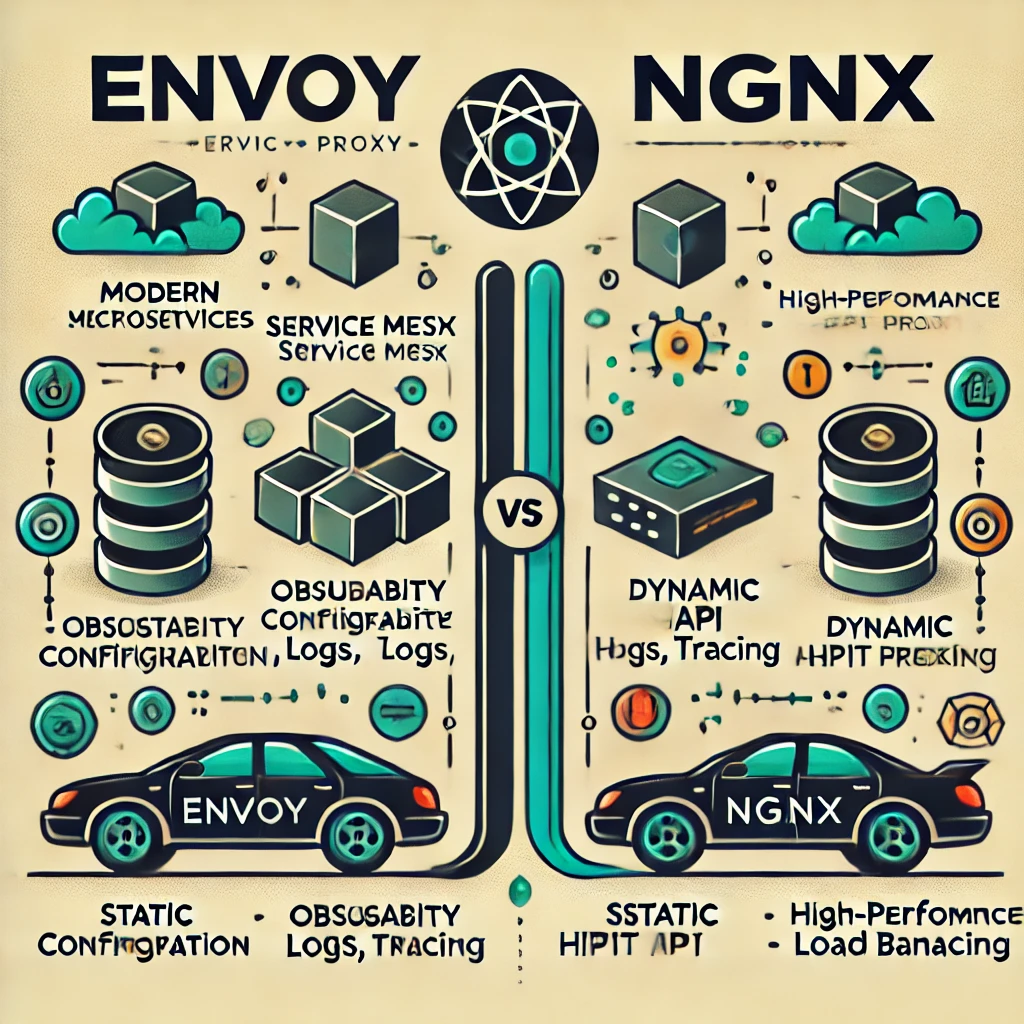Envoy Proxy vs NGINX:哪個適合你的架構?

在現代雲原生應用和微服務架構中,選擇合適的代理(Proxy)對於效能、可擴展性和安全性至關重要。Envoy Proxy 和 NGINX 是目前市場上最受歡迎的兩個選擇。儘管兩者都具備強大的功能,但它們適用於不同的場景並遵循不同的設計理念。本篇文章將探討它們的核心差異、優勢及最佳使用案例。
概述
NGINX
NGINX 最初是一款高效能的網頁伺服器,後來發展成為強大的反向代理和負載均衡器。由於其出色的HTTP 和 TCP 處理能力,它被廣泛應用於傳統和現代 Web 應用。
Envoy Proxy
Envoy 是由 Lyft 設計的現代化高效能代理,專為雲原生架構打造。它是Istio 和 Consul 等服務網格(Service Mesh) 的關鍵組件,具備高可觀測性、動態配置及與微服務環境的深度整合。
架構與設計理念
| 特色 | Envoy Proxy | NGINX |
|---|---|---|
| 設計理念 | 專為雲原生微服務架構打造 | 最初設計為網頁伺服器,後來發展為代理 |
| 配置管理 | 支援動態服務發現與 API(xDS) | 依賴靜態配置,變更需重新載入 |
| 效能 | 針對分散式架構最佳化 | 高效能適用於傳統 Web 流量 |
| 可觀測性 | 內建監控指標、日誌與分佈式追蹤 | 基礎日誌與監控能力 |
| 擴展性 | 支援 gRPC API、過濾器與動態路由 | Lua 腳本,動態能力有限 |
配置與管理
NGINX 配置
NGINX 主要依賴靜態配置文件(nginx.conf),更改設定後需要重新載入才能生效。這對於傳統應用來說問題不大,但在動態微服務環境中可能帶來挑戰。
範例 NGINX 設定:
Envoy 配置
Envoy 採用更具動態性的 API 配置,例如 xDS(Extensible Discovery Service),可即時更新設定,無需重新啟動代理。
範例 Envoy 設定:
static_resources:
listeners:
- name: listener_0
address:
socket_address:
address: 0.0.0.0
port_value: 10000
filter_chains:
- filters:
- name: envoy.filters.network.http_connection_manager
typed_config:
"@type": type.googleapis.com/envoy.extensions.filters.network.http_connection_manager.v3.HttpConnectionManager
stat_prefix: ingress_http
route_config:
name: local_route
virtual_hosts:
- name: backend
domains: ["*"]
routes:
- match:
prefix: "/"
route:
cluster: service_backend
關鍵差異: - Envoy 支援即時動態更新,NGINX 則需手動修改配置並重新載入。 - Envoy 適用於服務網格(Service Mesh)架構,更適合微服務環境。
效能與可擴展性
- NGINX 以其高吞吐量和事件驅動架構著稱,適合用於靜態內容和傳統 Web 應用。
- Envoy 針對服務間通訊(Service-to-Service Communication) 進行優化,支援 gRPC 和 HTTP/2,並提供內建可觀測性及容錯機制。
- 延遲:NGINX 在處理靜態內容時表現稍優,而 Envoy 在動態路由與服務發現方面更具優勢。
可觀測性與監控
可觀測性(Observability)是選擇代理時的一個重要考量因素:
- NGINX 具備基本的日誌與監控功能,但需額外整合第三方工具以獲得更深入的可觀測性。
- Envoy 內建支援:
- 監控指標(Prometheus、StatsD)
- 分佈式追蹤(Zipkin、Jaeger、OpenTelemetry)
- 結構化日誌
範例 Envoy 追蹤設定:
tracing:
http:
name: envoy.tracers.zipkin
typed_config:
"@type": type.googleapis.com/envoy.config.trace.v3.ZipkinConfig
collector_cluster: zipkin
collector_endpoint: "/api/v2/spans"
結論: 如果需要深度可觀測性,Envoy 會是更好的選擇。
安全性功能
| 特色 | Envoy Proxy | NGINX |
|---|---|---|
| mTLS(雙向 TLS) | 原生支援 | 需額外配置 |
| RBAC(角色存取控制) | 支援 | 不支援 |
| JWT 驗證 | 內建支援 | 需外掛 |
| WAF(Web 應用防火牆) | 無(需額外整合) | NGINX Plus 提供 |
結論: Envoy 內建較強的安全性功能,而 NGINX Plus 提供企業級 WAF(需付費)。
適用場景
何時選擇 NGINX
✅ 需要高效能的 Web 伺服器來處理 HTTP/TCP 流量。
✅ 架構為單體式(Monolithic)或傳統負載均衡模式。
✅ 需求是輕量級靜態配置,並希望減少依賴。
何時選擇 Envoy Proxy
✅ 微服務或服務網格(Service Mesh)架構。
✅ 需要動態服務發現、高級監控與追蹤功能。
✅ 應用程式依賴 gRPC、HTTP/2 或 API Gateway 模式。
結論
Envoy Proxy 和 NGINX 各有所長,適用於不同的架構與需求。
- NGINX 是傳統 Web 應用、負載均衡與反向代理的理想選擇。
- Envoy Proxy 在雲原生、微服務環境與服務網格中表現出色。
最終選擇取決於你的應用需求。如果你的應用是高度可擴展的雲原生架構,Envoy 是更好的選擇。而對於傳統 Web 工作負載,NGINX 仍然佔據主導地位。
你的選擇是什麼?
你在架構中使用的是 Envoy 還是 NGINX?歡迎在評論區分享你的經驗!




